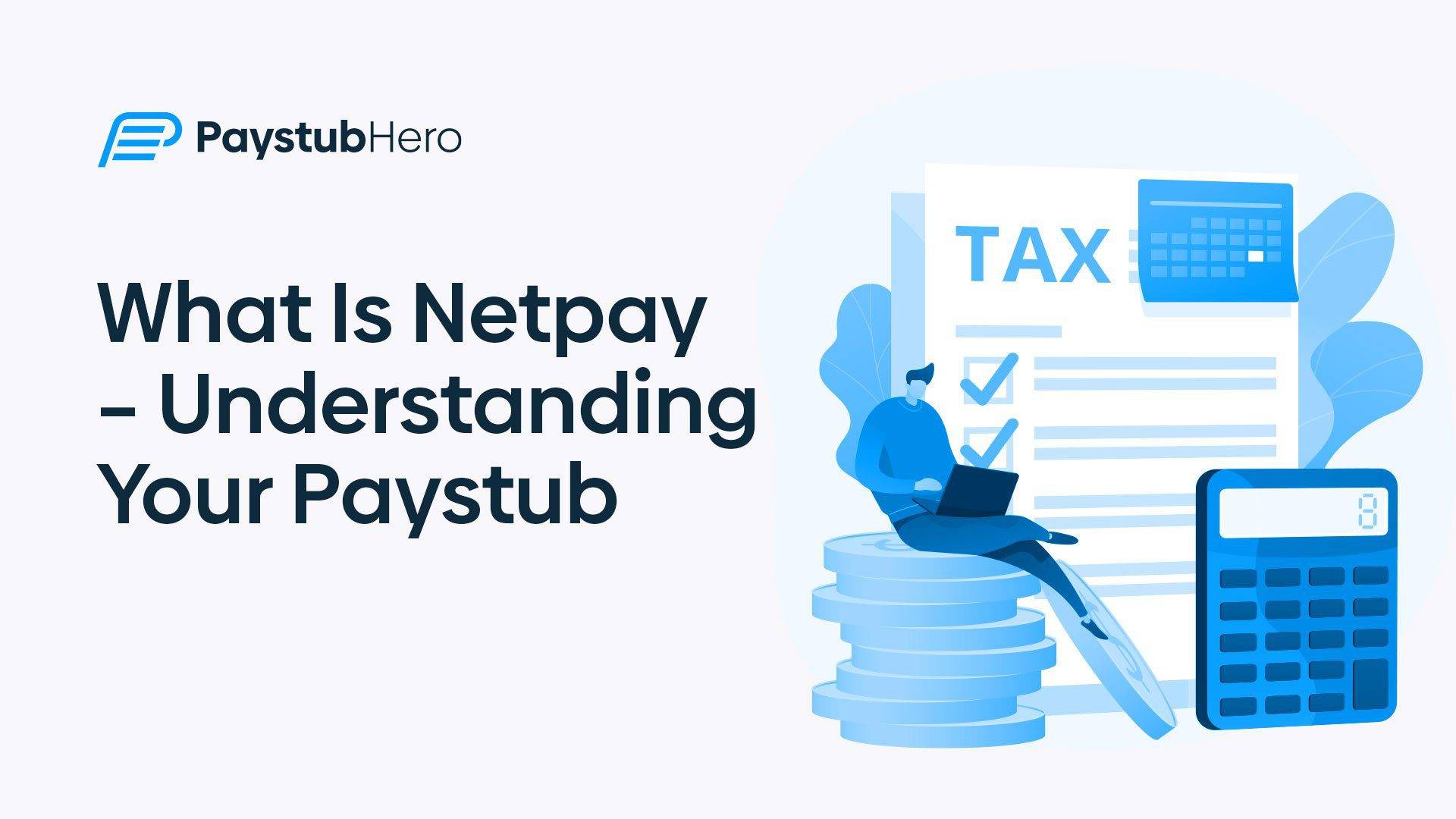Have you ever held your paystub in your hands, eyes scanning the numbers and terms, only to find yourself feeling more perplexed than enlightened?
It’s not an uncommon experience. Between gross pay, net pay, taxes, and other deductions, understanding your paystub can feel like you’re trying to decode a complex mathematical puzzle.
If you’ve ever asked yourself, what is netpay?, we have the answer for you. Netpay is your take-home earnings, the amount that lands in your bank account after all deductions have been made from your gross income. It’s the money you actually get to spend on bills, groceries, leisure activities, or stash away in savings.
However, net pay is more than just a number on your paystub; it’s an essential part of your financial health and personal budgeting. Understanding your net pay helps you know your true earnings, manage your money effectively, and plan your financial future with clarity.
But don’t worry if you still find this a bit confusing. We’re here to guide you through the intricacies of your paystub, clear up any misconceptions, and help you understand the importance of your net pay. We’re diving into the world of payroll, breaking down terms, and providing you with the knowledge to navigate your paystub with confidence.
Stay with us as we decode the mystery of net pay, explore the difference between net pay and gross pay, provide an understandable net pay definition, and demonstrate how your net income affects your take-home pay.
Table of Contents
- Introduction
- Net Pay vs Gross Pay: The Fundamental Difference
- Understanding the Net Pay Definition: A Comprehensive Breakdown of Deductions
- Is Net Income After Taxes the Same as Net Pay? Clarifying Common Pay Terms
- Knowing Your Worth: The Vital Significance of Understanding Net Pay
- Your Paystub Explained with Paystubhero: Simplifying Payroll for Solo Entrepreneurs and Small Businesses
Net Pay vs Gross Pay: The Fundamental Difference
The distinction between net pay and gross pay is crucial when it comes to understanding your paystub. But what do these two terms mean, and how do they affect your salary?
First, let’s get to grips with gross pay. Your gross pay is the entire amount of money you earn before any deductions come into play. Imagine it as a whole pie — your total earnings pie. This includes your basic pay, but also any extras like overtime, bonuses, and commissions.
Net pay, on the other hand, is a bit different. Consider net pay as the slice of the pie that you actually get to enjoy.
It’s commonly referred to as your “take-home pay,” and it’s what’s left after all deductions, such as taxes, insurance, and retirement contributions, have been subtracted from your gross pay. This is the amount you receive in your bank account; the actual money you have to cover your expenses and plan your budget.
Let’s take an illustrative example to make things more concrete. Suppose you have a gross salary of $5,000 per month.
After all the deductions, say around $1,500 for taxes, insurance, and retirement contributions, you’re left with $3,500. This $3,500 is your net pay – the money you actually get to spend or save.
Understanding the difference between net pay and gross pay is key to navigating your personal finances and making informed financial decisions. It’s not just about knowing how much you make, but how much of that you get to keep.
By comprehending this, you gain a greater awareness of your financial standing and take a big step towards effective budget management.
Understanding the Net Pay Definition: A Comprehensive Breakdown of Deductions
To get a complete understanding of the net pay definition, it’s essential to grasp what kinds of deductions are subtracted from your gross pay. These deductions play a vital role in determining your net pay — the final sum that lands in your bank account.
Let’s delve deeper into these deductions and their impact on your net pay:
- Federal and State Taxes: One of the most significant deductions from your gross pay is taxes. The United States has a progressive tax system, which means that the percentage you’re taxed depends on your income level and tax bracket. Uncle Sam is sure to take his slice of your earnings pie.
- Social Security and Medicare: These are obligatory contributions made by each worker in the U.S. The money you contribute ensures a financial safety net for when you retire or if you become ill. It’s an important slice of your gross pay that guarantees you support in later life or in times of medical need.
- Insurance Premiums: If you have opted for health, dental, or life insurance through your employer, these premiums will be deducted from your gross pay. These contributions are essential for protecting yourself and your family’s well-being, so even though they reduce your net pay, they provide peace of mind.
- Retirement Contributions: If you contribute to a 401(k) or another retirement plan, these amounts will also be taken from your gross pay. Retirement contributions are a fundamental part of long-term financial planning. While they may reduce your current net pay, they ensure you have a comfortable financial cushion when you retire.
Each of these deductions plays a crucial role, and understanding them can help you plan your finances better and predict your net pay more accurately. Being aware of these deductions allows you to manage your financial health effectively, and it helps you understand why your net pay might be less than your gross salary.
The power of knowledge in personal finance cannot be underestimated. It gives you the tools to manage your money wisely and to plan for a secure financial future.
Is Net Income After Taxes the Same as Net Pay? Clarifying Common Pay Terms
This question brings us to an area of common confusion in understanding paystubs. The terms “net income after taxes” and “net pay” are often used interchangeably, which can muddy the waters of our comprehension. Let’s clear up the ambiguity once and for all.
Yes, net income after taxes is essentially the same as net pay. When we talk about net pay, we’re referring to the amount left after all deductions, including taxes, have been subtracted from your gross income. It’s the final figure that lands in your bank account at the end of each pay period.
When you see ‘net income after taxes’, it’s simply highlighting one of the most significant deductions from your gross pay — the taxes.
However, it’s important to remember that taxes aren’t the only deductions. Other elements, such as health insurance premiums or retirement contributions, are also subtracted from your gross pay to arrive at your net pay.
The clarification of these terms is crucial for understanding your actual income. Knowing that your net pay or net income after taxes is what you finally receive can help you make more informed decisions about spending, saving, and investing.
By recognizing these terms and their meanings, you gain a more precise knowledge of your income and how it’s calculated. This understanding is a stepping stone to effective financial planning and more confident navigation of your paystub.
Knowing Your Worth: The Vital Significance of Understanding Net Pay
Understanding the concept of net pay isn’t merely about decoding a paystub or a jargon-filled financial document. It’s about realizing your worth and better planning your financial future. The significance of net pay goes beyond the paycheck; it’s a crucial piece in the puzzle of financial literacy.
When you grasp your net pay, you gain insight into your actual earnings — the real amount of money that you can spend, save, or invest. This is essential for managing your day-to-day finances, covering living expenses, planning major purchases, and even preparing for financial emergencies.
But the importance of understanding your net pay doesn’t stop at your current budgeting. It’s also about future financial planning.
With a clear knowledge of your net pay, you can evaluate how much you can realistically save for retirement or how much of a mortgage or car loan you can afford. It’s a cornerstone of financial awareness that plays a key role in the big financial decisions of life.
Moreover, understanding your net pay also helps in ensuring fair compensation for your work.
By knowing what you should expect to take home after all deductions, you can ensure your gross salary is in line with your needs, your qualifications, and the market rates for your role.
In essence, knowing your net pay is about empowerment. It’s about having the knowledge and confidence to manage your money effectively, plan for the future, and ensure you’re being compensated fairly for your work.
The more you understand your pay and the deductions made, the better equipped you’ll be to navigate your financial journey.
Your Paystub Explained with Paystubhero: Simplifying Payroll for Solo Entrepreneurs and Small Businesses
In the labyrinth of payroll management and paystub decoding, Paystubhero emerges as a beacon of simplicity and precision. We believe that understanding your net pay should not be a Herculean task.
That’s why we’ve designed our online payroll software to cut through the complexity, making it easier for entrepreneurs, freelancers, small businesses, and independent contractors to generate their paystubs and manage their payroll effectively.
With Paystubhero, you’re not just getting a tool; you’re getting a partner committed to helping you understand your paystub. Our user-friendly interface requires nothing more than entering your company and employee information, and we take care of the rest.
Our software handles the calculations, removing the possibility of errors and providing you with a clear, easy-to-understand paystub.
But why is this important? When you have a clear understanding of your net pay, you can better manage your finances and make informed decisions.
You gain a solid foundation on which to base your budgeting, spending, saving, and financial planning. This knowledge can empower you to take charge of your financial destiny.
Not only do we simplify the process, but we also do it in a cost-effective way.
Paystubhero is an ideal solution for those who might find traditional payroll systems like ADP or Gusto out of reach due to their higher prices and focus on larger businesses. We’ve created a robust, efficient, and affordable solution for the solo entrepreneur and small business community.
With Paystubhero, you’re not just getting a software; you’re embracing a smarter, stress-free way of handling payroll and understanding your net pay. The power to take control of your finances and secure a robust financial future is just a few clicks away.
So why wait? Start your journey towards a better understanding of your paystub with Paystubhero today.
Frequent Asked Questions
- Is your paycheck your net pay?
- Yes, your paycheck is your net pay. It’s the amount you receive after all deductions, like taxes and insurance premiums, have been subtracted from your gross income.
- What is net pay used for?
- Net pay is used for your daily expenses, savings, and investments. It’s the money you actually have available to manage your financial needs and goals.
- What is net pay vs net income?
- Net pay and net income generally refer to the same thing – the money you take home after all deductions from your gross income. These terms are often used interchangeably in the context of paystubs.
- How do you calculate net pay?
- To calculate net pay, you subtract all the deductions (like taxes, insurance, and retirement contributions) from your gross pay. The result is your net pay – your take-home earnings.









